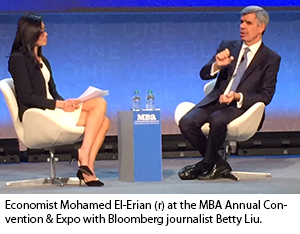
El-Erian Looks Ahead in an ‘Uncertain’ World
DENVER–Business people need resilience and optionality to succeed in the current “uncertain” world, said Mohamed El-Erian, Chief Economic Advisor with Allianz, Munich, Germany at the recent Mortgage Bankers Association’s Annual Convention & Expo.
“You cannot be a good house in a challenged neighborhood,” El-Erian said. “The neighborhood matters. What happens in the world around you really matters.”
 El-Erian said mortgage bankers should not be concerned with actions of the Federal Reserve. “You can expect the Fed to hike interest rates in December and you may see a couple hikes next year regardless of who leads the Fed,” he said, noting current Fed Chair Janet Yellen’s term will expire in February. “But this does not mean you should not worry about central banks as a whole. Perhaps the Fed is almost on autopilot in the U.S. and that’s why markets are doing so well.”
El-Erian said mortgage bankers should not be concerned with actions of the Federal Reserve. “You can expect the Fed to hike interest rates in December and you may see a couple hikes next year regardless of who leads the Fed,” he said, noting current Fed Chair Janet Yellen’s term will expire in February. “But this does not mean you should not worry about central banks as a whole. Perhaps the Fed is almost on autopilot in the U.S. and that’s why markets are doing so well.”
The week before he spoke was a “perfect week,” El-Erian said. “Every single day a new record was set by the stock market and volatility is almost nonexistent. So the financial markets understand the Fed will not disrupt them.” But other central banks including the European Central Bank could create volatility.”
The Fed will continue shrinking its “massive” $4.5 billion balance sheet, El-Erian said. “But it will be like watching paint dry; they will make it as boring as possible. If they misjudge the process they’ll get back onside pretty quickly.”
Interest rates have not been negatively correlated to risk assets to the extent one might expect, El-Erian noted. “We have the Fed to thank for that. But there is lots of uncertainty out there. Look at the economics of it. My profession–economics–is struggling to understand production, wage determination and inflation. There are three very basic inputs into any economic model, but our understanding is very low, probably because of technology.”
El-Erian said economists do not fully understand how technology is changing all sorts of relationships. “The global economy is not summing up,” he said. “Look at exchange rates: no country wants to have a strong currency. It’s like a hot potato, and that’s problematic. You’re starting to see trade tensions at the macro level–like NAFTA and Brexit–rather than at the micro level.”
There is also geopolitical uncertainty, El-Erian noted. “You can’t predict what North Korea might do or if the U.S. will respond preemptively or not. That’s a major uncertainty. Just one of many geopolitical uncertainties.”
On the political side, El-Erian noted a growing “anti-political” movement, citing President Trump’s election, Britain’s Brexit vote and Emmanuel Macron’s election to France’s presidency with no political party. “People are angry, which produces unusual political outcomes,” he said. “So we’re in a strange situation in that what matters most to you is predictable and confident but what happens around you is unusually uncertain. That’s the environment in which you operate.”
El-Erian said he sees two possible scenarios: both political, not economic.
“Scenario one is we get a political response that delivers pro-growth measures,” El-Erian said. “Tax reform, deregulation, infrastructure investment and better global coordination. If you get that, low growth becomes high growth and the middle class is not left out. Not just the Fed but the European Central Bank can normalize in a beautiful fashion. The political environment gets better. That’s one potential outcome, but it requires politicians to step up to their economic governance responsibilities.”
But scenario two could occur if politicians cannot agree, El-Erian said. “There would be no tax reform, they do little to prepare society for technological disruptions, the middle class is hollowed out, central banks cannot normalize in that beautiful fashion, we see low growth and the stock market can no longer be justified. You get financial volatility and the political process gets a lot trickier. You have to prepare for this world.”
Resilience will be critical in this world, El-Erian noted. “We have been on a wonderful journey with low interest rates, good supply and sufficient incomes, but there is fundamental uncertainty we’ve been shielded from by the world’s central banks,” he said. “Recognize that there are very different outcomes for that journey; that speaks not just to what you do but how you do it–your business model. Ask yourself: do you have sufficient resilience and optionality?”
